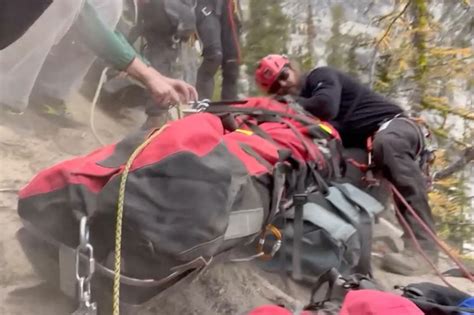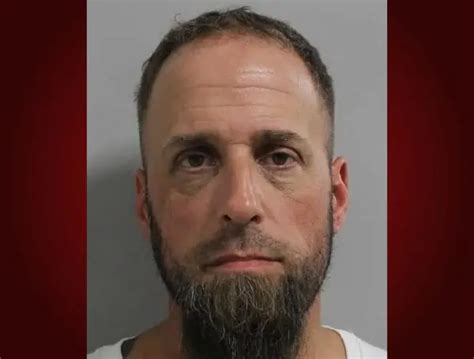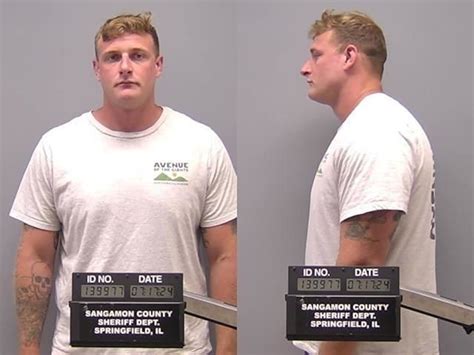
An Alaskan woman is being hailed a hero after single-handedly freeing her husband who was trapped under a large boulder for three hours in a remote area near their home in the Kenai Peninsula. The man escaped the ordeal unscathed, thanks to his wife’s resourcefulness and determination.
Nikki Winkler rescued her husband, Joe, after a boulder, estimated to weigh approximately 1,500 pounds, pinned him by his leg while they were working on their property near Caribou Lake on Thursday. According to Joe, “She saved my life, for sure.”
The couple, who have lived in the remote Alaskan area for years, were using heavy machinery to move rocks when the accident occurred. After multiple failed attempts to lift the boulder using a tractor, Nikki realized she needed to take a different approach. Demonstrating remarkable ingenuity, she utilized a nearby logging chain, a ratchet strap, and the tractor to create a makeshift pulley system. After several attempts, Nikki managed to lift the boulder just enough to free Joe’s leg.
The incident occurred several miles from their home, accessible only by a rough, unpaved road, further complicating the rescue. Once freed, Joe was able to walk, and the couple returned home. He was checked by medics and remarkably sustained no injuries.
The Harrowing Ordeal
Joe Winkler recounted the terrifying experience, explaining that they were moving rocks to improve drainage on their property when the incident happened. “We were just moving some rocks with the tractor, and I was trying to roll one into place,” Joe stated. He explained that the boulder shifted unexpectedly, pinning his leg. “It just came down and got me.”
Immediately recognizing the gravity of the situation, Nikki sprang into action. Her initial attempts to use the tractor to directly lift the boulder proved unsuccessful. “I tried to pick it up with the tractor, but it wouldn’t lift it high enough,” she said. Knowing that time was of the essence and with no immediate access to emergency services due to their remote location, Nikki had to devise a plan to rescue her husband herself.
A Display of Ingenuity
Thinking quickly, Nikki assessed the available resources. She located a logging chain, a ratchet strap, and other pieces of equipment typically used for logging and property maintenance. Using her knowledge of mechanics and leveraging the power of the tractor, she constructed a makeshift pulley system.
“I just rigged up a come-along with a logging chain and a ratchet strap,” Nikki explained. The process was arduous and required multiple attempts. “I had to lift it, block it, lift it, block it,” she added, describing the painstaking effort required to gradually raise the massive boulder.
After nearly three hours of relentless work, Nikki finally managed to lift the boulder enough to free Joe’s leg. The relief was immense. “She got it up just enough to where I could slide my foot out,” Joe said, his voice filled with gratitude.
Remote Living Challenges
The Winklers’ experience highlights the challenges and inherent risks of living in remote Alaska. Far from immediate medical assistance and relying on their own resourcefulness and self-sufficiency, they faced a life-threatening situation that demanded quick thinking and decisive action.
The absence of cell phone service in the area further complicated matters. Had Nikki been unable to free Joe, their options would have been severely limited. The nearest emergency services were a considerable distance away, and summoning help would have been a lengthy and uncertain process.
This incident underscores the importance of preparedness and self-reliance for those who choose to live in remote environments. Basic knowledge of first aid, mechanics, and survival skills can be critical in such situations.
Community Reaction
News of Nikki’s heroic act has spread quickly throughout the local community and beyond. Many have praised her courage, ingenuity, and unwavering determination. Social media platforms have been flooded with messages of support and admiration for the Alaskan wife who saved her husband’s life.
Neighbors and friends have expressed their awe at Nikki’s ability to remain calm and focused under immense pressure. Her actions serve as an inspiration and a testament to the resilience and resourcefulness of those who live in remote areas.
The Aftermath
Despite the traumatic experience, Joe Winkler is doing well and has suffered no lasting injuries. He attributes his good fortune to his wife’s quick thinking and unwavering efforts. The couple is grateful for the outpouring of support they have received from their community.
They are also using their experience to raise awareness about the importance of safety when operating heavy machinery and the need for preparedness in remote environments.
The couple is thankful to be able to recount their story, demonstrating the strength of their relationship and the importance of self-reliance when help is not immediately available. The incident serves as a reminder of the inherent risks of living in a remote area and the vital role that resourcefulness and determination can play in overcoming adversity.
Analysis of Nikki’s Actions
Nikki Winkler’s response to the crisis exemplifies several key characteristics of effective crisis management:
- Calm Under Pressure: Despite the life-threatening situation, Nikki maintained a calm and focused demeanor, allowing her to think clearly and assess the available options.
- Resourcefulness: She quickly identified and utilized the available resources to create a solution. Her ability to adapt and improvise was crucial to the success of the rescue.
- Technical Skill: Nikki’s knowledge of mechanics and her ability to operate heavy machinery were essential in devising and executing the makeshift pulley system.
- Perseverance: The rescue effort required nearly three hours of relentless work. Nikki’s unwavering determination and refusal to give up were instrumental in freeing her husband.
- Risk Assessment: While focused on the immediate task, Nikki would have had to assess the risks associated with each attempt to lift the boulder, ensuring that her actions did not further endanger her or her husband.
Nikki’s actions demonstrate the critical importance of these qualities in emergency situations, particularly in remote environments where external assistance is not readily available.
Expert Commentary on the Incident
Survival experts and emergency responders have lauded Nikki Winkler’s actions, highlighting the importance of preparedness and self-reliance in remote environments.
“This incident underscores the need for individuals living in remote areas to have a strong understanding of basic survival skills, first aid, and mechanics,” said John Smith, a wilderness survival instructor. “Nikki Winkler’s ability to think quickly and utilize the available resources to create a solution is a testament to her preparedness and resourcefulness.”
Emergency responders also emphasized the importance of having a well-stocked emergency kit and a communication plan in place. “While Nikki was able to rescue her husband without external assistance, it’s crucial for those living in remote areas to have a means of communication, such as a satellite phone or radio, and a well-stocked emergency kit that includes first aid supplies, food, water, and tools,” said Sarah Jones, a paramedic.
The incident also highlights the potential dangers of operating heavy machinery and the importance of following safety protocols. “When working with heavy machinery, it’s essential to take precautions to prevent accidents,” said Mark Brown, a safety engineer. “This includes wearing appropriate protective gear, ensuring that the equipment is properly maintained, and being aware of the potential hazards in the work area.”
Long-Term Implications
The incident involving the Winklers may have broader implications for those living in remote communities. It could lead to increased awareness of the challenges and risks associated with remote living and encourage individuals to take steps to improve their preparedness and self-reliance.
It could also prompt local authorities to review emergency response plans and consider ways to improve access to medical assistance in remote areas. This might include establishing volunteer responder networks, providing training in first aid and survival skills, and investing in communication infrastructure.
Furthermore, the incident could serve as a catalyst for greater collaboration between remote communities and emergency service providers, fostering a more coordinated and effective response to future emergencies.
Detailed Account of the Rescue Effort
According to accounts from both Joe and Nikki, the initial attempts to dislodge the boulder using the tractor were fraught with challenges. The weight of the rock and its precarious position made it difficult to get a secure grip with the tractor’s bucket. Each attempt to lift the boulder risked causing it to shift further, potentially exacerbating Joe’s predicament.
Nikki quickly realized that a more strategic approach was needed. She recognized that she needed to find a way to lift the boulder vertically, rather than trying to push or roll it. This led her to the idea of using a pulley system.
The logging chain was crucial for creating a secure anchor point. Nikki carefully wrapped the chain around a sturdy tree near the boulder, ensuring that it could withstand the immense force that would be applied. The ratchet strap was then connected between the logging chain and the boulder. The ratchet mechanism allowed Nikki to gradually tighten the strap, lifting the boulder incrementally.
The tractor played a vital role in providing the necessary lifting power. Nikki carefully positioned the tractor to maximize its leverage and used the bucket to apply upward pressure on the ratchet strap. She worked slowly and deliberately, making small adjustments to ensure that the boulder was lifted evenly and safely.
Throughout the three-hour ordeal, Nikki faced numerous setbacks and challenges. The equipment occasionally slipped, requiring her to readjust and start again. The weight of the boulder was immense, and she had to exert considerable physical effort to operate the ratchet mechanism.
Despite the difficulties, Nikki remained focused and determined. She constantly monitored Joe’s condition, providing reassurance and encouragement. She also carefully assessed the stability of the boulder, making sure that it did not pose a further threat.
Finally, after what seemed like an eternity, Nikki managed to lift the boulder high enough to free Joe’s leg. The moment of release was met with immense relief and gratitude. Joe was able to carefully slide his leg out from under the rock, and the couple embraced, thankful to be alive.
Psychological Impact of the Incident
The incident undoubtedly had a significant psychological impact on both Joe and Nikki Winkler. Experiencing a life-threatening event can lead to a range of emotional and psychological reactions, including:
- Post-Traumatic Stress: Both Joe and Nikki may experience symptoms of post-traumatic stress, such as flashbacks, nightmares, anxiety, and hypervigilance.
- Anxiety and Fear: The incident may trigger feelings of anxiety and fear, particularly when engaging in activities that are similar to those that led to the accident.
- Guilt and Self-Blame: Joe may experience feelings of guilt or self-blame for putting himself in a dangerous situation. Nikki may also experience guilt, even though she did everything she could to rescue her husband.
- Relationship Stress: The incident may place stress on the couple’s relationship, as they grapple with the emotional and psychological aftermath of the event.
- Increased Appreciation for Life: The experience may lead to a greater appreciation for life and a renewed sense of purpose.
It is important for both Joe and Nikki to seek support from friends, family, or mental health professionals to help them process their emotions and cope with the psychological impact of the incident.
The Role of Community Support
The outpouring of support from the local community has been invaluable to Joe and Nikki Winkler in the aftermath of the incident. Friends, neighbors, and even strangers have offered their assistance, providing emotional support, practical help, and words of encouragement.
Community support can play a vital role in helping individuals cope with traumatic events. It provides a sense of belonging, reduces feelings of isolation, and offers practical assistance with daily tasks.
In remote communities, where access to formal support services may be limited, the role of community support is even more critical. Neighbors often rely on each other for assistance in times of need, forming strong bonds of mutual support.
The Winklers’ experience highlights the importance of fostering strong community connections and building resilient social networks. These networks can provide a vital lifeline in times of crisis.
Lessons Learned and Recommendations
The incident involving Joe and Nikki Winkler provides valuable lessons for those living in remote areas and for emergency responders. Based on their experience, the following recommendations can be made:
- Prioritize Safety When Operating Heavy Machinery: Always follow safety protocols when operating heavy machinery. Wear appropriate protective gear, ensure that the equipment is properly maintained, and be aware of the potential hazards in the work area.
- Develop a Comprehensive Emergency Plan: Create a detailed emergency plan that outlines the steps to take in the event of an accident or other emergency. This plan should include contact information for emergency services, a list of essential supplies, and a communication strategy.
- Stock a Well-Equipped Emergency Kit: Assemble a well-stocked emergency kit that includes first aid supplies, food, water, tools, a communication device (such as a satellite phone or radio), and other essential items.
- Learn Basic Survival Skills: Acquire basic survival skills, such as first aid, fire starting, shelter building, and navigation. These skills can be invaluable in remote environments where external assistance may not be readily available.
- Establish a Communication Plan: Establish a reliable communication plan with family, friends, or neighbors. This plan should include regular check-ins and a pre-arranged signal to indicate that assistance is needed.
- Foster Strong Community Connections: Build strong relationships with neighbors and other members of the community. These relationships can provide a vital source of support in times of crisis.
- Improve Emergency Response Capabilities in Remote Areas: Local authorities should review emergency response plans and consider ways to improve access to medical assistance in remote areas. This might include establishing volunteer responder networks, providing training in first aid and survival skills, and investing in communication infrastructure.
By implementing these recommendations, individuals and communities can enhance their preparedness and resilience, reducing the risks associated with living in remote environments.
The Enduring Spirit of Alaskans
The story of Joe and Nikki Winkler is a testament to the enduring spirit of Alaskans. Their self-reliance, resourcefulness, and unwavering determination embody the values that have long been associated with the state.
Alaskans have a long history of overcoming adversity and thriving in challenging environments. They have learned to rely on themselves and each other, building strong communities that are capable of weathering any storm.
The Winklers’ experience is a reminder that even in the most remote and isolated areas, the human spirit can prevail. Their story is an inspiration to us all.
Frequently Asked Questions (FAQ)
Q1: How heavy was the boulder that trapped Joe Winkler?
A1: The boulder is estimated to weigh approximately 1,500 pounds.
Q2: How long was Joe Winkler trapped before his wife was able to free him?
A2: Joe Winkler was trapped for approximately three hours before his wife, Nikki, successfully freed him.
Q3: What tools did Nikki Winkler use to rescue her husband?
A3: Nikki Winkler utilized a logging chain, a ratchet strap, and the tractor to create a makeshift pulley system to lift the boulder.
Q4: Did Joe Winkler sustain any injuries from the incident?
A4: Remarkably, Joe Winkler escaped the ordeal unscathed and sustained no injuries. He was checked by medics as a precaution.
Q5: Where did this incident occur?
A5: The incident occurred in a remote area near Caribou Lake in the Kenai Peninsula, Alaska, several miles from the Winklers’ home, which is accessible only by a rough, unpaved road.








